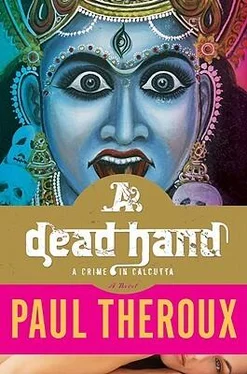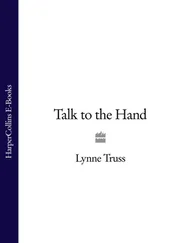But now I had a subject, someone I would have found impossible to invent, and no one knew her as I did. She had few vulner-abilities, but they went deep. She was human, and her frailties helped me know her better. Her closest secret was her fear of the mob, her anxiety whenever she saw large numbers of people, the packed-together crowd that seemed to her like a many-headed creature. Her fear was so fundamental it was like a fear of India, and a form of guilt, like that of a fugitive seeing an angry mob and expecting it to pounce. I always think they want to devour me. She reacted to mobs, seeming to struggle, and afterward she was weakened, as if just the sight of so many people was an exertion.
She managed this fear in a way I had seen many foreigners do. She had chosen her own India. She'd invented an India that suited her, and when the crowd got to be too much, she escaped to her simpler, spiritual vault. She confined her movements to specific places; she looked for safe corners; she avoided the bazaars and markets and mobs.
As for food, she was fussy to the point where she would sometimes refuse to eat; rather than eat something doubtful, she would not eat at all. That point where a religious person becomes rigidly observant, when piety becomes stubbornness and even paranoia. "Take that foul dish away," she might say to a waiter. She sounded imperious and sure of herself, but I knew better: she was afraid, and when she was afraid she slipped into her Englishness. That foul dish.
She must have guessed that I saw beneath her certainties, that I understood her fears; and that made her cling to me. I'd seen her cry. In anyone else, crying was an extension of laughter. With Mrs. Unger, crying was a form of collapse. I'd seen it only once, but it was so anguished and final I felt she'd never get over it, never return from it, never be the same again. Perhaps she needed me too.
Mrs. Unger was a character in all senses of the word, multidimensional, someone I admired especially for her ability to create. Out of the bustees of Calcutta and the chawls of Assam, the exploited girls on the back street and the lost children in the slums, she was giving life. It was a species of rescue, an act of will. She was the person a writer longs to meet, because she was someone almost unimaginable — a good person, not a saint but a woman of action and vision, and for me (I wasn't quite sure how to describe this part) an object of desire, someone adorable. She had given me hope.
The animal sacrifices she had made in Kalighat and encouraged in Gauhati were not aberrations. They were life-giving — that's what sacrifice is, a profound offering, an enhancement. I saw the glittering blade, heard the heartbeat tapped out on the drum, saw the warm black goat jammed between two posts and, in a flash, its head struck from its body, the blood pouring onto the blossoms and the muck of the stone floor of the slaughterhouse. That blood released me. The sight of it stayed with me. Life sprang from blood; life went on.
And I remembered how Mrs. Unger's white sari was never without the slight stain of blood, a dark stripe at the hem or a blood spatter on the lower part of her sari that looked like freckles, the same size and brownish color, a sort of umber. It was visible only close up, but I knew it was blood — blood that made her white sari whiter, purer.
I sat on the upper verandah of the Hastings and wrote the beginnings of what I imagined might be a novella, something I'd call "A Dead Hand." I needed to fictionalize, to give myself latitude to invent. The title was one that it seemed had been chosen for me, because, unable to write, I'd felt I had a dead hand. And the moment an actual dead hand had come into my possession, I recaptured my ability to write. I was now awakened, in the live hands of Mrs. Unger. I kept her name for my main character because I didn't intend to take any liberties with her.
In the first pages I wrote about receiving the old-fashioned letter, about meeting Mrs. Unger at the Oberoi Grand, the invitation to the Lodge in Alipore, and the experience in her vault, her healing hands. The very word "vault" was evocative to me and represented the passion and secrecy of our meetings. She had admitted me to her vault in every sense.
I was privileged to write about that rarest of beings, a thoroughly good person who had found a way of using her fortune to improve people's lives. She didn't preach, she hadn't founded an order of nuns, she wasn't a celebrity — she avoided all publicity. She was practically unknown. I freely surrendered to her; I wanted to belong to her. As a result, I had a character; I even had a narrative. She had healed me too. The sight of the child whores, the tribals on the back street in Nagapatti, was something I would never forget. Analyzing my feelings, I began to see that, though I was horrified by the small girls' selling themselves, I was also fascinated and aroused to think that, for a pittance, I could have had any of them. And that unworthy feeling helped me distinguish between the expression of mindless lust and the elevating desire I now knew. I would not have experienced any of this except for the intervention of Mrs. Unger.
Almost as satisfying as her good works was her beauty. At first, I had seen her as rather severe, almost forbidding, holding court, a little too majestic with Charlie and Rajat on either side of her. But time softened that image and deepened my understanding. She had clear skin with a rosy blush on it, and her hair, drawn back Indian-style, gave her an impressive forehead above her piercing eyes. The Calcutta heat kept moisture on her glowing face, and the tropical sunlight emphasized the sculpted planes and angles of her skull. Her nose was sharp, like an instrument of inquiry; her lips were full and soft. She was slightly bucktoothed, and her side teeth were prominent, so her lips were usually parted, making her expression more sexual, somewhat hungrier. Her breasts were lifted against her billowing shawl and loose sari, her nipples like subtle pegs against the silk. I loved her slender feet, with a stippled floral pattern that might have been painted or tattooed.
Even wearing sandals she was almost as tall as me. She walked purposefully and yet upright, with grace, like a dancer, but a tall one, singular and strong. Parvati would have seemed like a schoolgirl next to her. Mrs. Unger had a way of holding her left wrist with her right hand, turning the bangles and the gold cuff with her fingers as she spoke, as though the jewelry were an outward symbol of her power or a badge of her authority. She wore an anklet, a gold chain; she had gold rings on some of her fingers, and a nose jewel, a ring with a pea-sized diamond at her right nostril. Yet these jewels were warm, the gold like flesh.
She was perfumed, trailing a sweetness that was so enticing I wanted to taste her, to lick her shoulders, to eat her — and she must have known that, because she had allowed it, had urged me to go deeper, to penetrate her not with my wand of light (her expression) but by insinuating myself inside her. Yet to think that this woman was so lovely within, had such a good heart, a great soul — this was all the inspiration I needed to write. In the days after our return from Assam, in the steamier premonsoon heat, I was reborn as a writer.
In this unlikely place for a rebirth, the shaded upper verandah of the Hotel Hastings, above the thickened dust of its lane off Sudder Street, I was given new life. I was happy. I was grateful too. I had thought my creative life was over; I was ashamed to be pretending that I was a writer. That thought must have kept me traveling: I didn't want to stay anywhere long enough for someone to see how little I wrote, how futile I felt. "I've got to be in Bangkok," or "I'm going to Vietnam in a few days," or "I have an assignment" — the restless movement, a pretense of being busy, kept everyone from seeing that I had nothing to write, that travel was my habit of evasion, and like all habits a dreary repetition, a folding and refolding of feeling, a diminishment. All habits are tinged with sadness, for being habits.
Читать дальше












